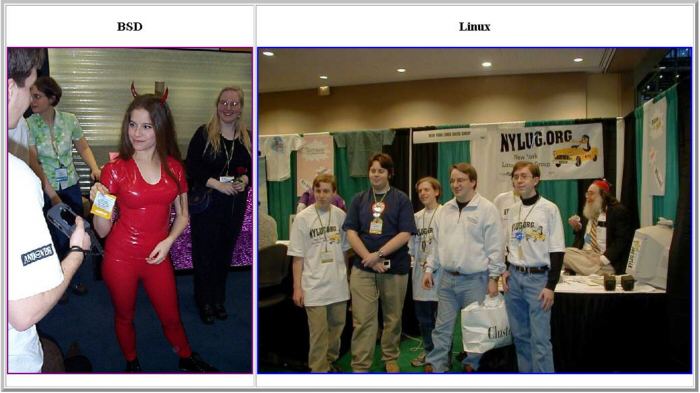"Because it's not Linux" seems a bit shadey to me, no offense. I like to stick with using a product because it can get the job at hand done better, but not because it's "not something else". Using something because you dislike something else is usually a recipe for problems.
As to me... I stopped using Linux a long time ago in favor of Sun Solaris/x86. I don't care for OS's which introduce changes with every release for the sole reason of the change itself. On Linux stuff can change on a developers whim and that's not the way I want to run my server farm. Another reason is because support on Linux - generally speaking - sucks. It's not all bad but there's a lot of garbage out there.
For example: LTS. Long Term Support, mostly looking at Ubuntu. While it is true that an LTS version gets supported for a longer period of time, the downside which no one speaks of is that development doesn't stop. Upgrading from one LTS version to another usually effectively boils down to doing
several major version upgrades at once. Going from version 10.x to 13.x is no exception. That's really not my idea of "Long Term Support", it's more in the likes of: "Long Term Upgrade Postpone". With all the risks involved. You'll probably have to make up for the postponed time tenfold.
I am a little worried that FreeBSD might be heading down this path as well eventually. Thing is: this is easier for the developers, but not for the end-users.
And we're already going there somewhat: the shorter support cycle for example is proof of this. When a new release comes out (when is a little bit of anyones guess) then they want to burn bridges because the previous version will only be supported for 3 months tops.
It's still a lot better than your average Linux distribution in my opinion, but it's also a step in the direction of "what's easiest for the developers" while somewhat ignoring the userbase.
But back to the question at hand...
When (wh)Oracle took over Sun it was the beginning of the end for Solaris. I had a support contract as a hobbyist for the only reason that I wanted to support the OS and the company. When I got the choice to pay triple for less support I knew I was going to jump off the bandwagon.
I wanted a mature Unix-like OS which also provided support for ZFS. Well.. FreeBSD provided. Linux only started recently with ZFS support and well... Last March ZFS on Linux landed but unfortunately
data disappeared. ZFS has been around for what? 12 years now? And it has been available through open source for a long period as well. BSD could make it work, Linux developers... not so much it seems.
That should also tell you something in my opinion.
So yah, I discovered FreeBSD and its excellent ZFS support, I tested, moved and I basically never looked back.
 I LOVE Linux, don't get me wrong. But FreeBSD does things Linux can't. And vice-versa.
I LOVE Linux, don't get me wrong. But FreeBSD does things Linux can't. And vice-versa.  It's like a breath of fresh air (even MORE so when coming from Windows.) I also like FreeBSD because all I had to do to get it to work with my flat screen TV with the AMD HDMI Port was edit a simple Text File...
It's like a breath of fresh air (even MORE so when coming from Windows.) I also like FreeBSD because all I had to do to get it to work with my flat screen TV with the AMD HDMI Port was edit a simple Text File...  Also, I get so much more into FreeBSD when I have a lot of Caffeine.
Also, I get so much more into FreeBSD when I have a lot of Caffeine.  What drew you guys to FreeBSD?
What drew you guys to FreeBSD?

